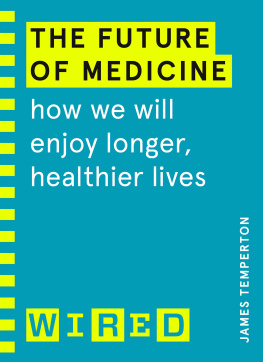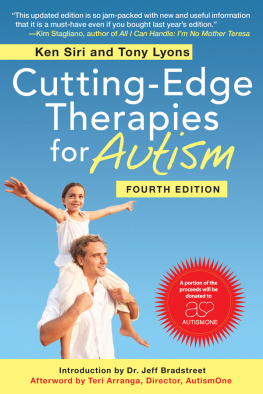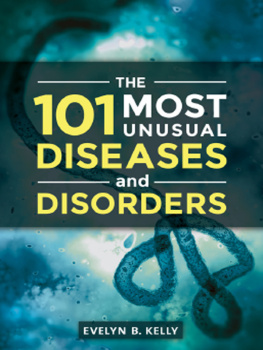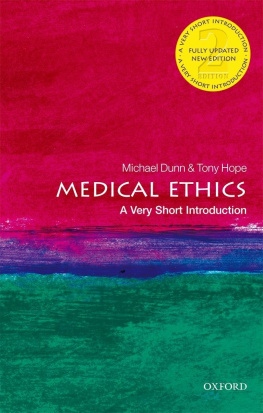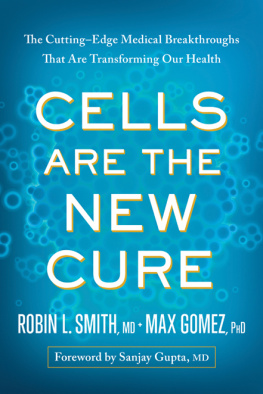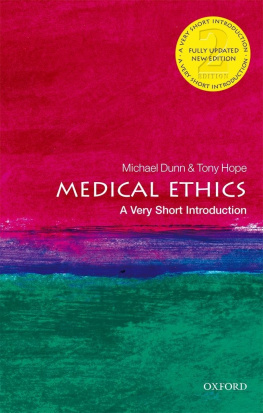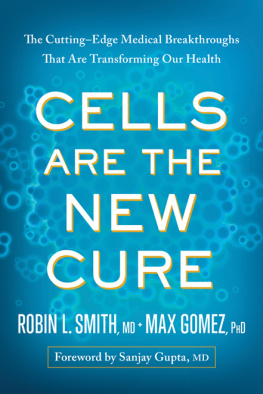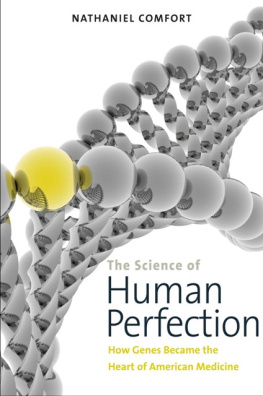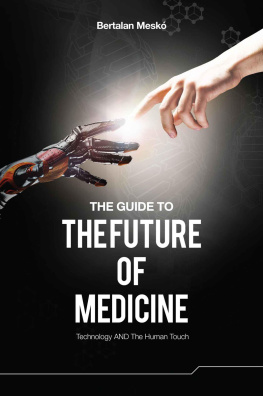
James Temperton
THE FUTURE OF MEDICINE
How We Will Enjoy Longer, Healthier Lives

Contents
About the Author
WIRED is the worlds most authoritative and respected publication reporting on the emerging trends, ideas and technologies shaping our world. Our mission is to tell the stories of the people who are driving this change and to understand its impact on business, society and individuals. WIRED has become synonymous with informed and intelligent analysis of these transformational forces and the significance of them for industries and individuals and is a consistently reliable predictor of change.
James Temperton is the digital editor at WIRED UK.
Introduction: The future of you
Which number is greater: the number of galaxies in the observable universe or the number of cells in your body? The answer may surprise you. Our best estimate for the number of cells in the human body is based on an average: a 30-year-old, weighing about 70 kilos, measuring 170 centimetres tall and with a body surface area of 1.85 square metres. This average human is a muddle of variables: their cells vary in size and, depending on where they are in their body, also vary in density. Take these variables into account and tally them up across the average human and you get a very large number: 3.72 x 1013. Or 37.2 trillion cells.
To work out the number of galaxies in the observable universe you need to point the Hubble Space Telescope at a patch of sky and count up the galaxies. There are caveats: this method doesnt account for galaxies merging over time and misses those we cannot see. But the best estimate we have shows there are between 100 billion and 200 billion galaxies in the observable universe. So 37.2 trillion versus, at most, 200 billion. Its barely even a contest. The number of cells in your body outnumbers galaxies in the universe by 37 trillion. If getting your head around that number is hard, consider this: each trillion is made up of 1,000 billions.
The human body is almost incomprehensibly complex. So its not surprising that modern medicine should have spent the past 200 years unlocking its mysteries. The first vaccine, for smallpox, was discovered in 1796. Cell theory the idea that all living organisms are made up of cells was conceived of in 1839. Back then, life expectancy at birth for men born in England and Wales was 40.2 years. For women it was 42.2 years. Today it stands at 79 years for men and 82.8 years for women. By the end of the century, life expectancy at birth in the worlds most developed nations could exceed 100 years. To get there, and beyond, we will enter a new era of healthcare: one where doctors are charged with maintaining health, not treating disease; where one-size-fits-all will be replaced with one-size-fits-one. Its a future where we will all live longer, healthier lives. And this future will be powered by data. Lots of data.
Right now, the majority of healthcare data is based on population averages. Thats why, in the UK, all women over the age of 50 are invited for breast-cancer screening every three years. In the US it is recommended that women aged 5074 get a mammogram every two years. This screening is a best guess, made using data gathered across the population. But what if we knew, from birth, which people had a higher likelihood of developing certain diseases? And what if, throughout our lives, doctors could monitor our bodies based on high-resolution, granular data rather than broad, population-level averages? In the coming decades our medical records wont be a scatter of observations made throughout our lives; instead they will provide a complete picture of who we are, based on data collected about us throughout our lives. This process will begin before birth, when our genomes are sequenced while we are still foetuses. Our genetic records will be carried with us throughout our lives. Over time, our genome will be combined with other biological data, building up a more complete picture of what makes us healthy and what makes us sick. Our personal health profiles will also include data about the individual cells in our bodies and a deep understanding of their function. In combination, these datasets will help doctors make informed and preventative decisions.
Youve probably heard of the Human Genome Project the gold standard for ambitious, groundbreaking science. Completed in 2003, the project successfully sequenced and identified all three billion chemical units that make up our genetic instructions. Adjusted for inflation, the project, which started in 1990, cost $5 billion. You can now get your genome sequenced for less than $200. Genomics has the potential to transform healthcare. In 2018 researchers in the UK gave us a glimpse of its potential by sequencing the genomes of 100,000 National Health Service (NHS) patients. Participants gave their permission for the data to be linked to information about their medical condition and health records, with that data then being shared with researchers. The aim of the project is to better understand the genetic causes of rare diseases, cancers and infectious diseases. This treasure trove of genetic data has now become a powerful tool for research and diagnosis, with plans to add data from hundreds of thousands more patients over the coming years, to better understand how to treat and prevent disease. And genetic data is just the start. It will be joined by high-resolution data about every facet of our bodies from wearables that detect the signs of disease before we even display symptoms, to diagnostic tests that hone in on the smallest of irregularities.
This data avalanche has the potential to transform the pharmaceutical industry, informing the creation of treatments that tackle diseases currently seen as either unrealistic targets for drug development or, cruelly, not profitable enough to warrant investment. In many cases the science is ready but the regulators and pharmaceutical companies are not. The clinical trials of today already show what is possible for diseases such as cancer, while research laboratories the world over are focused on the collection and processing of increasingly high-resolution data to uncover the root causes of diseases, both rare and widespread. An aggressive but considered move towards more personalised, precision healthcare will unlock huge benefits. In other cases, egoists and billionaire dreamers imagine an alternate, science-fiction future where all diseases have been cured and death has been solved.
But this isnt a story about ego and hubris. Its a story about heartbreak, sacrifice and survival against all the odds. The story of the future of healthcare is being written by the pioneers of the present; it is the story of how we will all one day come to live, grow old and die. The experts working at the frontier of healthcare all agree that change is necessary and achievable. But they also all agree that change is possible and soon. In some cases, such as using cell therapy to treat cancer, change is already under way. Regulation is in place and pharmaceutical companies have worked out ways to build profitable, scalable businesses from scientific breakthroughs, with the potential to save many millions of lives. Similar challenges of regulation, scalability and profitably are yet to be realised in fields such as molecular psychiatry and longevity but that change is coming.
The next wave of technology wont replace the healthcare professionals that exist today, but will rather augment them. A routine trip to the doctor will plug into a vast, potentially global repository of anonymised patient data to help make informed decisions about diagnosis and treatment. Artificial intelligence (AI), already being used at scale by biotechnology start-ups, will become a crucial ally if we are to have any hope of analysing and understanding the exabytes of data collected from billions of patients all across the world.
Next page
